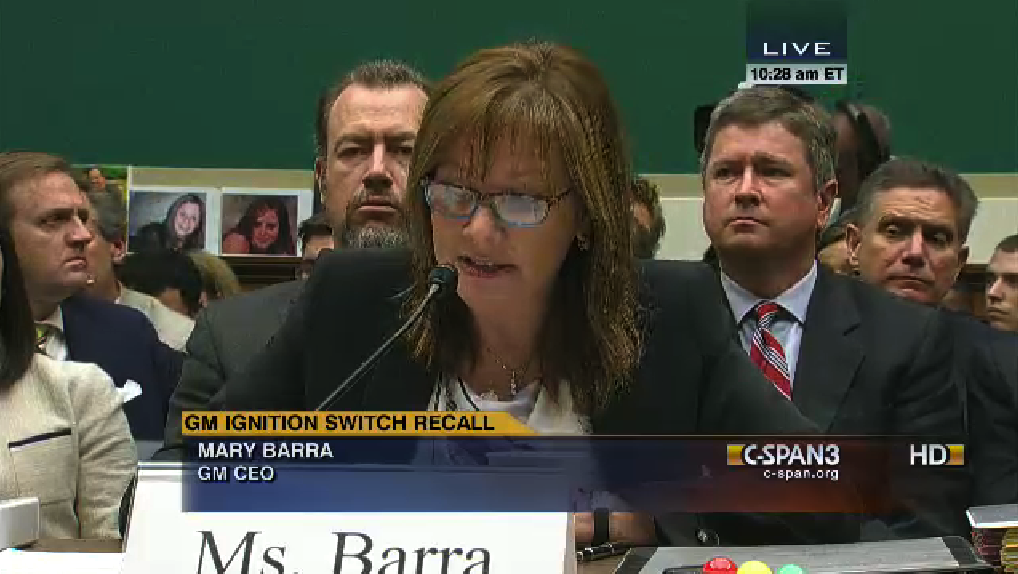Lawmakers Not Exactly Thrilled By GM CEO Mary Barra
 A lot has happened since General Motors CEO Mary Barra first appeared before lawmakers looking into the massive GM ignition switch recall tied to at least 13 deaths. The company has admitted a culture of incompetence while denying a cover-up, recalled another 3 million vehicles, and faces concerns that the total death count may be significantly higher than 13. So this morning’s hearing before a Congressional subcommittee was less friendly than Barra’s previous visit.
A lot has happened since General Motors CEO Mary Barra first appeared before lawmakers looking into the massive GM ignition switch recall tied to at least 13 deaths. The company has admitted a culture of incompetence while denying a cover-up, recalled another 3 million vehicles, and faces concerns that the total death count may be significantly higher than 13. So this morning’s hearing before a Congressional subcommittee was less friendly than Barra’s previous visit.
Barra, along with Anton Valukas, the former U.S. Attorney hired by GM to investigate the 12-year delay in issuing a recall on the defective switch, appeared before the House Energy and Commerce Subcommittee on Oversight and Investigations.
Subcommittee Chair Tim Murphy of Pennsylvania said that the lack of care demonstrated by GM during the decade in which it chose to ignore the obvious safety problem is “far more troubling” than any allegations of a cover-up, as it implies that GM employees were “either incompetent or intentionally indifferent.”
Murphy criticized the car maker for being “in no great hurry” to figure out the problem while the bodies piled up, failing to recognize a problem with the airbags for years, then failing to link that airbag issue to a problem with the electrical system, then not following that thread to the ignition switch defect until 2013.
Many of these connections were actually made by attorneys for plaintiffs in earlier lawsuits filed against GM, rather than anyone at the car company, and Murphy questioned whether or not GM’s attorneys might have deliberately hid information turned up during these lawsuits in order to prevent a massive recall.
“These switches were bad from the start,” said Rep. Diana DeGette of Colorado. “They should never have been installed.”
She knocked the Valukas report for not explaining how the faulty switch was approved in the first place, for not explaining why GM did not consider stalling a safety issue, or where the culture of incompetence at GM came from.
Both Barra and Valukas claim that no senior GM execs knew of these defects until recently, but Rep. DeGette says that this ignorance at the highest levels of the company “is nothing to be proud of.”
She referenced what Barra has called the “GM Nod,” a tendency in the company to agree to anything said in a meeting only to have nothing happen.
“Do you think the GM Nod was limited to just the 15 people who were fired?” asked DeGette.
Valukas responded that no, there were many people guilty of having that attitude.
“The company culture is what concerns me,” said DeGette, citing “a culture that encourages people not to stick their necks out and report things.”
The Congresswoman says she’s been told that the Valukas report has not had the effect of improving the culture at GM, but has instead only created more paranoia at the car maker, where employees are now afraid of being fired for bringing a problem to management.
Barra cited the company’s Speak Up for Safety” program, which she says recognizes employees for coming forward with safety concerns. The CEO pointed to the recent rash of recalls as evidence that the company is not trying to sweep problems under the rug.
Barra also confirmed that the in-development compensation program — which is only for people who have been affected by crashes — will be in lieu of taking GM to court, meaning that those who take part in the program will give up their ability to sue GM.
Rep. Fred Upton of Michigan asked Barra if, in light of recent reports that the fatality figures will likely end up being higher than the 13 known deaths, GM has revised numbers on fatal incidents.
“With the info we have… the known number we have is still 13,” replied Barra, who reiterated that she knows of no deaths related to the recall from earlier this week.
Bruce Braley, Congressman from Iowa, expressed concern that the Valukas report contains redacted information in the version that was provided to lawmakers.
He also brought up the issue of the divide between the “Old GM” (the company before its 2009 bankruptcy filing) and the “New GM.” As part of the bankruptcy filing, the New GM has no legal liability for non-crash claims related to cars made by Old GM.
Braley asked whether it was possible that this separation contributed to the lax culture and approach to recalls in the five years between the formation of the New GM and the ignition recall.
Valukas and Barra denied that, with the CEO saying “We’ve redoubled our efforts” to go back and find possible defects in cars made by the Old GM.
The hearing is ongoing. You can watch live here:
Broadcast live streaming video on Ustream
Want more consumer news? Visit our parent organization, Consumer Reports, for the latest on scams, recalls, and other consumer issues.

